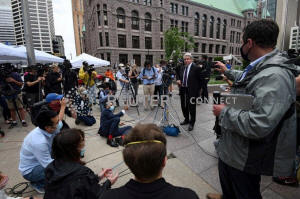Minneapolis judge to hear gag order appeal in Floyd case
 Send a link to a friend
Send a link to a friend
 [July 21, 2020]
By Brendan O'Brien [July 21, 2020]
By Brendan O'Brien
(Reuters) - A Minneapolis judge will hold a
hearing on Tuesday to consider a request from media outlets and defense
lawyers to relax a gag order in the case against four officers accused
of killing George Floyd, which launched a global anti-racism movement.
Hennepin County District Court Judge Peter Cahill issued a gag order on
July 9 prohibiting parties from speaking publicly about the case and
restricting access to case records. Cahill said pretrial publicity could
taint a jury pool and impair the right to a fair trial.
One of the former officers, Derek Chauvin, 44, pinned his knee into
Floyd's neck on May 25 when he and the three other former policemen were
arresting Floyd in a Minneapolis neighborhood. Floyd was later
pronounced dead at a hospital.

The incident, caught on video by bystanders, sparked massive and
continuing protests against racial injustice and calls for police
reforms.
Several local news organizations, along with CNN, CBS and the New York
Times Co, are arguing that the order intrudes on their constitutional
free speech rights.
The gag order restricts not only an "incredibly broad array of speech by
the parties and their lawyers, but also subjects a staggering number of
individuals not involved in these prosecutions to the same
restrictions," the organizations said in a court document.
[to top of second column]
|

Robert Paule, Tou Thao's lawyer, addresses the media after an
omnibus court hearing in the case against Derek Chauvin, the former
Minneapolis police officer charged with murdering George Floyd in
Minneapolis, Minnesota, U.S. June 29, 2020. REUTERS/Nicholas Pfosi/File
Photo

Chauvin is charged with second-degree murder. J. Alexander Kueng,
Tou Thao and Thomas Lane, the three other former officers, are
charged with aiding and abetting in the case.
Attorneys for the four men also filed objections to the gag order,
arguing it is depriving their clients of their right to free speech.
They argued that restricting the media from viewing videos and other
records of the incident can cause the public to have a one-sided
view of the case that could benefit the prosecution.
(Reporting by Brendan O'Brien in Chicago; editing by Bill Tarrant
and Leslie Adler)
[© 2020 Thomson Reuters. All rights
reserved.] Copyright 2020 Reuters. All rights reserved. This material may not be published,
broadcast, rewritten or redistributed.
Thompson Reuters is solely responsible for this content.
 |